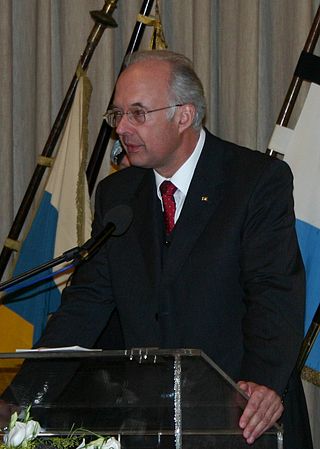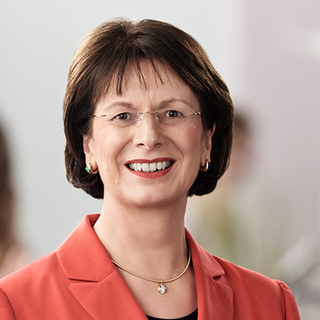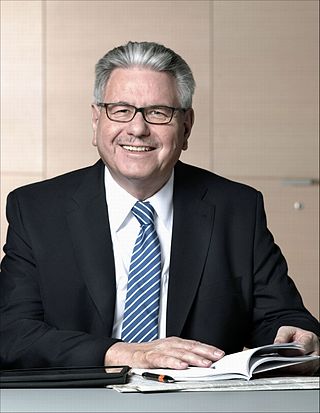Related Research Articles

Ludwig Wilhelm Erhard was a German politician and economist affiliated with the Christian Democratic Union (CDU), and chancellor of West Germany from 1963 until 1966. He is known for leading the West German postwar economic reforms and economic recovery in his role as Minister of Economic Affairs under Chancellor Konrad Adenauer from 1949 to 1963. During that period he promoted the concept of the social market economy, on which Germany's economic policy in the 21st century continues to be based.
The social market economy, also called Rhine capitalism, Rhine-Alpine capitalism, the Rhenish model, and social capitalism, is a socioeconomic model combining a free-market capitalist economic system alongside social policies and enough regulation to establish both fair competition within the market and generally a welfare state. It is sometimes classified as a regulated market economy. The social market economy was originally promoted and implemented in West Germany by the Christian Democratic Union under Chancellor Konrad Adenauer in 1949 and today it is used by ordoliberals, social liberals and modern (non-Marxist) social democrats alike. Its origins can be traced to the interwar Freiburg school of economic thought.
Ordoliberalism is the German variant of economic liberalism that emphasizes the need for government to ensure that the free market produces results close to its theoretical potential but does not advocate for a welfare state and did not advocate against one either.

The Wirtschaftswunder, also known as the Miracle on the Rhine, was the rapid reconstruction and development of the economies of West Germany and Austria after World War II. The expression referring to this phenomenon was first used by The Times in 1950.

Joachim-Friedrich Martin Josef Merz is a German politician serving as Leader of the Christian Democratic Union (CDU) since 31 January 2022 and as leader of the Union parliamentary group as well as the Leader of the Opposition in the Bundestag since 15 February 2022. In September 2024 Merz became Union's designated candidate for Chancellor of Germany for the 2025 federal election.

Paul Kirchhof is a German jurist and tax law expert. He is also a professor of law, member of the Pontifical Academy of Social Sciences and, a former judge in the Federal Constitutional Court of Germany (Bundesverfassungsgericht), the highest court in Germany.

Walter Eucken was a German economist of the Freiburg school and father of ordoliberalism. He is closely linked with the development of the concept of "social market economy".

Alfred Müller-Armack was a German economist and politician. He coined the term "social market economy" in 1946.

Claudia Kemfert is a German economics expert in the areas of energy research and environmental protection. She is a Professor of Energy Economics and Sustainability at the Hertie School of Governance in Berlin. She heads the Energy, Transportation, and Environment department at the German Institute for Economic Research.
Werner Abelshauser is a German economic historian.
Josef Rudnick was a German businessman and politician of the Christian Democratic Union of Germany.
Juergen Bernhard Donges was a German economist. He was professor emeritus of political economics at the University of Cologne, and was for a long time member of the German Council of Economic Experts.

Sven Giegold is a German politician of the Alliance 90/The Greens who has been serving as State Secretary in the Federal Ministry for Economic Affairs and Climate Action in the coalition government of Chancellor Olaf Scholz since 2021. He was a member of the European Parliament from 2009 to 2021.

Lars Peter Feld is a German economist who currently serves as director of the Walter Eucken Institut and as Professor for Economic Policy at the University of Freiburg. From 2020 to 2021 he also chaired the German Council of Economic Experts. Federal Minister of Finance Christian Lindner made Feld his personal economic policy advisor in February 2022.

Heiner Flassbeck is a German economist and public intellectual. From 1998 to 1999 he was a State Secretary in the German Federal Ministry of Finance where he also advised former finance minister Oskar Lafontaine on a reform of the European Monetary System. He became the Chief of Macroeconomics and Development of the United Nations Conference on Trade and Development (UNCTAD) in Geneva in January 2003, a position that he held until resigning at the end of 2012 due to his age.
The Initiative Neue Soziale Marktwirtschaft (INSM) – New Social Free Market Initiative – is a neoliberal German think tank and advocacy organization with headquarters in Berlin that was founded in 2000 by the employers' organization Gesamtmetall. Through professional communication, the INSM tries to create a favorable climate for free-market economic reforms, and entrepreneurship, emphasizing individual responsibility and competitiveness.

Marie-Luise Dött is a German politician of the Christian Democratic Union (CDU) who served as a member of the Bundestag from 1998 to 2021.
The Ludwig Erhard Foundation is a public policy organization founded in 1967 by West German ex-Chancellor Ludwig Erhard in Bonn.

Thomas Straubhaar is a Swiss economist and migration researcher. He is a professor for international economic relations at the University of Hamburg.

Heinz Peter Wichtel is a German politician (CDU) and trade unionist.
References
- ↑ "Was ist der Wirtschaft?" . Retrieved 16 January 2014.
- ↑ "Die Soziale Marktwirtschaft - Ludwig Erhard und das Wirtschaftswunder". Archived from the original on 2014-01-16. Retrieved 16 January 2014.
- ↑ "Ist der Wirtschaftsrat unabhängig?" . Retrieved 16 January 2014.
- 1 2 Roßmann, Robert (16 March 2021). "Stammgast im Zentrum der Macht" [Regular guest at the center of power]. Sueddeutsche Zeitung (in German). Retrieved 16 March 2021.
- ↑ Horten, Alphons (1997). Rückblick auf ein Jahrhundert. Erinnerungen eines Zeitzeugen. Freiburg im Breisgau. p. 115.
{{cite book}}: CS1 maint: location missing publisher (link) - ↑ "Wie ist der Wirtschaftsrat aufgebaut?" . Retrieved 16 January 2014.
- ↑ "Was macht der Wirtschaftsrat?" . Retrieved 16 January 2014.
- 1 2 "Bundesfachkommissionen". Archived from the original on 26 December 2013. Retrieved 16 January 2014.
- ↑ "Themengebiete des Wirtschaftsrates" . Retrieved 16 January 2014.
- ↑ Douglas, Eliot (11 April 2020). "Coronavirus: German lawmaker calls for delay to EU climate targets". Deutsche Welle . Retrieved 16 March 2021.
- ↑ Wehrmann, Benjamin (6 August 2020). "Germany's CDU Economic Council rejects ECB role in climate action as "pure industrial policy"". Clean Energy Wire / Handelsblatt . Retrieved 16 March 2021.